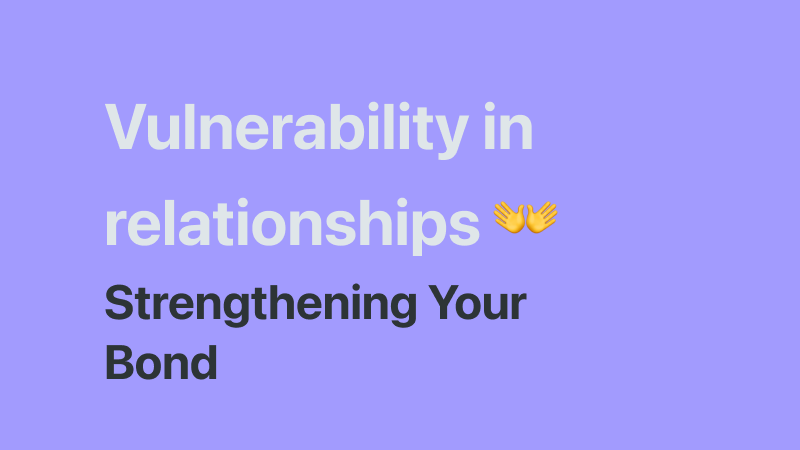Why Being Real Matters in Relationships
When it comes to building a strong, lasting relationship, openness and honesty can make all the difference. You’ve probably heard the phrase “be yourself” more times than you can count, but what does it really mean in the context of a relationship? It’s not just about sharing your interests or opinions—it’s about showing who you really are, even when it's uncomfortable.
That’s where vulnerability comes in.
Being vulnerable doesn’t mean you’re weak. It means you're real, and that authenticity is the key to deepening your connection with your partner. When you let your guard down, it invites your partner to do the same, creating a space where true intimacy can grow.
What Is Vulnerability, Really?
Vulnerability isn’t about spilling your deepest secrets at the dinner table. It’s about allowing yourself to be seen, flaws and all, and trusting that your partner will accept you. This openness helps build trust and fosters emotional intimacy, which are essential for a strong bond.
Here’s what vulnerability can look like in a relationship:
-
Sharing Your Fears and Insecurities: Instead of hiding what makes you feel uncertain, talk about it. This doesn’t mean unloading every worry, but discussing things that affect your relationship.
-
Expressing Your Needs: It’s easy to expect your partner to “just know” what you need, but the truth is, no one’s a mind reader. Openly discussing what you need helps prevent misunderstandings.
-
Being Honest About Your Feelings: Whether you're upset, excited, or unsure, sharing your true feelings lets your partner in. It might feel uncomfortable at first, but honesty creates connection.
Why Vulnerability Builds Stronger Bonds
Let’s face it—relationships aren’t always easy. Life can throw challenges your way, and the stronger your connection, the better equipped you’ll be to handle them together. Vulnerability plays a huge role in creating that strength. Here’s how:
-
Fosters Trust: When you show your true self, you’re essentially telling your partner, “I trust you.” In return, your partner feels more comfortable sharing with you, which builds mutual trust.
-
Creates Emotional Intimacy: Physical attraction is great, but emotional intimacy is what keeps relationships going long-term. Opening up about your emotions deepens your connection on a much deeper level.
-
Improves Communication: When you practice vulnerability, you’re encouraging open communication. You’re saying, “It’s okay to talk about tough things.” This type of honesty strengthens the bond between you and your partner.
-
Strengthens Problem-Solving: Vulnerable couples tend to handle conflicts better because they feel safe expressing their emotions. This makes it easier to resolve issues and move forward as a team.
-
Builds Resilience: Life isn’t perfect, and neither is your relationship. But vulnerability makes your relationship more resilient. You learn to navigate difficult moments together, with compassion and understanding.
How to Embrace Vulnerability in Your Relationship
Being vulnerable might not come naturally to everyone, and that’s okay. Here are a few tips to help you bring more openness into your relationship:
-
Start Small: You don’t have to dive into your deepest fears right away. Start by sharing smaller, everyday thoughts and feelings. Build your comfort level gradually.
-
Listen Without Judgment: Vulnerability goes both ways. When your partner opens up, listen carefully and respond with understanding rather than judgment. This creates a safe space for continued openness.
-
Be Patient With Yourself and Your Partner: It takes time to get comfortable with vulnerability. Be patient as you and your partner learn to open up more.
-
Celebrate Small Wins: Acknowledge the moments when you’ve both been open and honest. These small victories build momentum for deeper connections over time.
-
Use “I” Statements: When expressing your feelings, focus on how you feel, rather than pointing fingers. For example, say “I feel hurt when…” instead of “You never…” This keeps the conversation constructive.
Overcoming Common Fears of Vulnerability
Opening up might feel risky. What if your partner doesn’t respond the way you hope? What if they reject you? These are common fears, but remember—vulnerability is about building trust, not about getting a perfect reaction every time.
Here’s how to manage the most common fears:
-
Fear of Rejection: It’s normal to worry about being rejected, but vulnerability actually helps you weed out shallow connections and deepen the ones that matter. True connection is built on acceptance.
-
Fear of Conflict: Many people avoid vulnerability to prevent conflict. But avoiding issues only creates distance. Honest conversations, even tough ones, are necessary for growth.
-
Fear of Being Misunderstood: Sometimes, when we open up, we worry our partner won’t understand. Keep in mind that vulnerability is a process—clarifying your feelings will come with practice.
Self-Reflection Question:
In what areas of my relationship am I holding back, and how can I take small steps to open up more?
Quick Quiz:
-
How does vulnerability impact your relationship?
a) It builds trust
b) It causes conflict
c) It makes no difference -
Which is the best way to start practicing vulnerability?
a) Share your biggest fear
b) Start with small, everyday thoughts
c) Wait until your partner opens up first -
What’s one key benefit of being vulnerable in relationships?
a) Improved communication
b) More frequent arguments
c) Emotional distance




